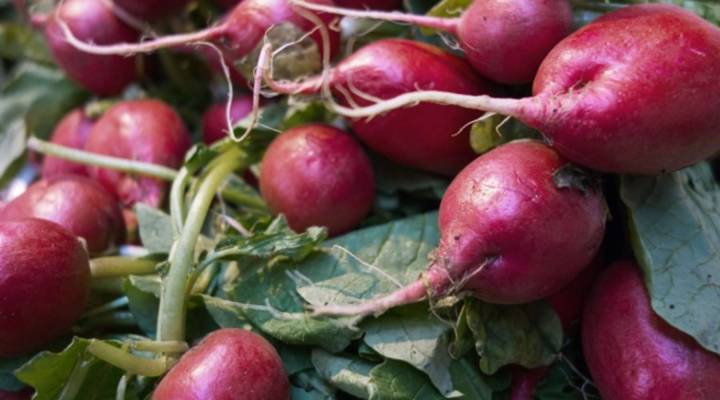
A youth farming initiative cultivates positive change

This summer, we marked ten years since devastating floods swamped New Orleans after Hurricane Katrina. A decade later, New Orleans is in full swing again. Throughout the city, there are all kinds of initiatives aimed at building and re-building community, including a program that brings young people together to farm.
Grow Dat Farm is a seven acre patch of land in New Orleans’ City Park. Now in its sixth year, Grow Dat’s goal in 2015 is to grow 20,000 pounds of fruit and vegetables, according to the program’s founder Johanna Gilligan — 70 percent of the produce is sold.
“We work with young adults coming from different high schools all over the city, different socioeconomic, racial backgrounds,” Gilligan said. “A lot of our focus is building strong relationships to foster an effective workplace is which each person can participate in a process of transformational change through the work of growing food.”
The farm has a yearly operating budget of $700,000. There are fruit trees, herbs, root vegetables, and berries throughout the farm. The program is funded through a mix of earned revenue, foundation and donor support. Each year, fifty students participate in the program.
Eighteen-year-old Dai’Zha Robinson’s favorite vegetable is kale.
“Coming into Grow Dat, I was a pretty bad child, always fighting,” she said. “When I came here it gave me more to do with my time outside of running the streets with people I shouldn’t.”
Her old friends think her new pursuit is a little strange.
“A lot of my friends are like, ‘you don’t farm. One, you’re a girl and you’re black,'” she said. “I’m like, ‘don’t knock it until you try it.'”
Robinson is headed to college in January and wants to become a police officer. And she said there is an added benefit working here.
“I’m getting toned,” she said. “My legs are getting toned from all the squats we’re doing while we’re weeding. It’s better than being in the gym right now.”
For 20-year-old Yasmin Davis, whose favorite vegetable is radishes, working on the farm taught her what’s healthy. She is studying sociology and public health at Tulane.
“When I first came here, I used to eat a lot of fast food,” she said. “I was not very aware of the food around me and how it was growing, or why it was growing the way it was growing.”
And since 30 percent of the produce is made available for the young farmers to take home, the young women always have plenty of fresh kale and radishes on hand.
There’s a lot happening in the world. Through it all, Marketplace is here for you.
You rely on Marketplace to break down the world’s events and tell you how it affects you in a fact-based, approachable way. We rely on your financial support to keep making that possible.
Your donation today powers the independent journalism that you rely on. For just $5/month, you can help sustain Marketplace so we can keep reporting on the things that matter to you.











